Subscriber Benefit
As a subscriber you can listen to articles at work, in the car, or while you work out. Subscribe Now
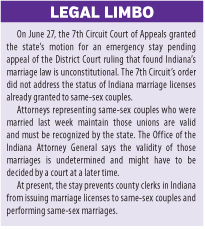 We remember history by the photographs.
We remember history by the photographs.
Whether the event is a heartbreaking tragedy or joyous celebration, we capture the images before us with our cameras. Those who were not there can look at the pictures and see the faces, feel the emotions, and get a sense of what the moment was like.
The pictures taken June 25 inside county clerks’ offices and outside courthouses show happy twosomes holding hands, exchanging vows, and hugging friends and family.
Cellphones and digital cameras saved the memories from those weddings with pictures that were rather ordinary in content but remarkable in meaning. The images depict the day when same-sex couples could legally marry in Indiana.
Craig Bowen and Jake Miller gleefully let everyone take their photo as they became the first gay couple in Marion County to wed. The pictures of the floppy-haired, bearded pair getting married and signing the marriage license are the images that history will keep.
“Hopefully (we’re) the first of many,” Bowen
said as he and his partner waited in line at the Marion County Clerk’s Office in Indianapolis.
The race to the courthouse began for many couples shortly after Richard Young, chief judge of the U.S. District Court for the Southern District of Indiana, issued a ruling that declared Indiana’s ban on same-sex marriage unconstitutional and permanently enjoined the state defendants from enforcing the laws barring same-sex marriage.
Young issued the ruling in three of the five lawsuits – Lee, et al. v. Pence, et al., 1:14-CV-00406; Fujii, et al. v. Pence, et al., 1:14-CV-00404; and Baskin, et al. v. Bogan, et al., 1:14-CV-0405 – filed since March against the state’s statute that defines marriage as only between one man and one woman. He found the law violates the 14th Amendment’s due process and equal protection clauses.
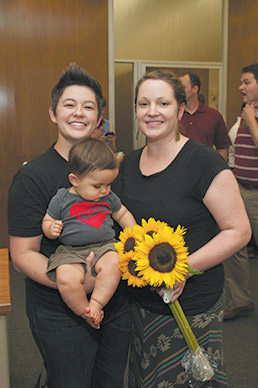 Many couples raced to clerk’s offices after the ruling, including Mindy, (L) Lacie and Harvey Little (IL Photo/ Eric Learned)
Many couples raced to clerk’s offices after the ruling, including Mindy, (L) Lacie and Harvey Little (IL Photo/ Eric Learned)“It is clear,” Young wrote, “that the fundamental right to marry shall not be deprived to some individuals based solely on the person they choose to love.”
He dismissed the fourth lawsuit, Love, et al. v. Pence, 4:14-CV-00015. Young agreed with the state that Gov. Mike Pence, the only defendant named, could not redress the plaintiffs’ injuries.
News of the ruling traveled through phone calls, emails and text messages. And soon the phones began ringing at county clerks’ offices with inquiries as to whether they were issuing marriage licenses for same-sex couples.
Indiana Attorney General Greg Zoeller’s office filed both an emergency motion to stay Young’s decision pending appeal and a notice of appeal to the 7th Circuit Court of Appeals. The 7th Circuit granted the emergency stay June 27.
In arguing that the plaintiffs’ motion for summary judgment should have been denied, the state asserts the Indiana Legislature has the legal authority to define marriage and that authority was not taken away when the Supreme Court of the United States made the landmark ruling in United States v. Windsor, 570 U.S. 12 (2013), which found sections of the federal Defense of Marriage Act unconstitutional.
The same-sex couples who filed the lawsuits and their attorneys know the fight has not ended but, noting the number of state marriage laws that have been overturned, they believe the U.S. Supreme Court will consider the matter soon and, again, affirm the recent rulings.
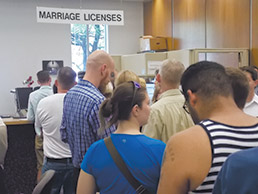 Same-sex couples wait in line at the Marion County Clerk’s Office June 25 for a marriage license. (IL Photo/ Dave Stafford)
Same-sex couples wait in line at the Marion County Clerk’s Office June 25 for a marriage license. (IL Photo/ Dave Stafford)“Marriage is still the same,” said Ken Falk, legal director for the American Civil Liberties Union of Indiana. “It’s between two people who love each other and want to commit to each other. Marriage is even stronger today than it was yesterday in Indiana.”
Ecstatic
Plaintiffs represented by the ACLU of Indiana in Fujii, et al. v. Pence, et al., gathered at the ACLU of Indiana’s Indianapolis headquarters to celebrate Young’s decision. Several keyed on the judge’s conclusion that “In time, Americans will look at the marriage of couples such as Plaintiffs, and refer to it simply as marriage – not a same-sex marriage.”
Steven Stolen, sitting next to Rob MacPherson, his partner of 27 years, said he, MacPherson and their two children, along with the other couples in the room, are the people to which Young was referring.
“We are the families down the street,” Stolen said. “As far as we’re concerned it doesn’t matter that we’re two men. We’re married.”
Tara Betterman and Melody Layne said the ruling brought great relief. The pair married in 2012 in New York and since then, their trips across state lines have led them to wonder which states recognize their marriage and which ones do not.
“I feel protected and I feel safe, finally,” Layne said.
In Evansville, Karen Vaughn-Kajmowicz, sergeant with the Evansville Police Department, stopped by the Vanderburgh County courthouse the day of the ruling to watch same-sex couples get married.
Vaughn-Kajmowicz and her wife, Tammy Vaughn-Kajmowicz, are among the plaintiffs in Lee, et al. v. Pence, et al. This lawsuit includes all first responders who had already been married elsewhere and were challenging the section of Indiana’s law that did not recognize same-sex marriages performed in other states.
The couples being wed were all strangers to Vaughn-Kajmowicz but she did not want to miss such a historical event.
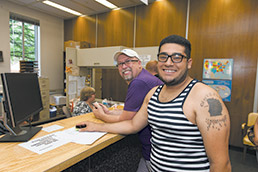 Leono Lopez, foreground, and Larry Guest apply for a marriage license at the Marion County Clerk’s Office June 25. (IL Photo/ Eric Learned)
Leono Lopez, foreground, and Larry Guest apply for a marriage license at the Marion County Clerk’s Office June 25. (IL Photo/ Eric Learned)“I felt like Tammy and I have worked hard to have this change happen,” she said. “I just wanted to see it.”
Confusion
Less than an hour after Young issued his ruling, Marion County Clerk Beth White announced her staff was trained and ready to begin offering marriage licenses and short civil ceremonies to same-sex couples.
White’s office, in an extended workday, issued 250 marriage licenses to both same-sex and opposite-sex couples, and it conducted 186 same-sex weddings. The last couple was married around 11 p.m.
Falk expected county clerks around the state to follow Marion County and begin issuing licenses immediately. However, some county clerks were not sure whether the decision applied to them and awaited guidance from the attorney general.
Zoeller’s advice did not do much to clear the confusion. The office instructed the five county clerks in Allen, Boone, Hamilton, Lake and Porter counties who had been named in the lawsuits to comply with Young’s ruling. To the remaining clerks, Zoeller simply said he “must encourage everyone to show respect for the judge and the orders that were issued.”
The day after Young’s ruling, Daviess County Clerk Sherri Healy was refusing to issue marriage licenses to gay and lesbian couples, citing her religious beliefs. Cass County Clerk Beth Liming also was not giving marriage licenses after county attorney John Hillis told her that she did not have to comply.
“Is that disrespectful to the judge? I don’t think so,” Hillis said.
Steve Sanders, professor at Indiana University Maurer School of Law, was unsure why some county clerks were not issuing licenses, but he noted one argument often made questions the authority of a federal judge. Some attorneys and legal scholars in other lawsuits have said if the federal judge decides a case that is not a class action, the decision does not apply statewide.
Attorney Karen Celestino-Horseman, a member of the plaintiffs’ legal team for Lee, et al. v. Pence, et al., had to explain to an excited same-sex couple that getting the license was just the first step. The pair had called her after receiving the marriage license to tell her they were married.
Celestino-Horseman advised them to quickly find someone to perform the ceremony. That way, the attorney said, even if the motion to stay is granted, the couple will still be married.
Soon, Celestino-Horseman may be performing some wedding ceremonies herself. Friends and clients have been putting in requests that she preside at their marriages.
“I have many, many dear friends who are gays and lesbians and on a personal level I’ve seen the loving relationship that exists,” she said. “I am so happy for them that they are going to have legal recognition of their relationship.”
Struggle
Indiana University Robert H. McKinney School of Law professor Shawn Boyne has been fighting for gay rights since 1991. At that time as a student at the University of Southern California’s Gould School of Law, she led a protest against the school’s invitation to then-U.S. Supreme Court Justice Byron White. He had authored the court’s opinion in Bowers v. Hardwick, 478 U.S. 186 (1986), which upheld Georgia’s sodomy law.
The school had threatened to not let her graduate, but Boyne found the decision too outrageous to remain silent.
As the 2014 session of the Indiana Legislature was gearing up to consider an amendment to the state constitution that would have defined marriage as only between opposite-sex couples, Boyne criticized the Indiana State Bar Association for not speaking out publicly against the measure.
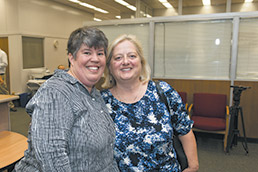 Chris Paulsen (L) and Deanna Medsker. (IL Photo/ Eric Learned)
Chris Paulsen (L) and Deanna Medsker. (IL Photo/ Eric Learned)“I think it’s important to live in an environment where you are accepted for who you are from a legal standpoint,” Boyne said. “I mean, it does hurt every time a member of the state government makes a statement that is non-accepting.”
After the day of hoopla that greeted Young’s decision, Ruth Morrison, retired battalion chief with the Indianapolis Fire Department, and her wife, Martha Leverett, settled at their home for the evening. They huddled around their computer looking at the photos posted on Facebook of friends getting married.
Morrison and Leverett, who have known each other for more than 20 years, traveled to Maryland in September 2013 to get married. They took photos of the courthouse and room where they were married by the justice of the peace.
Like Karen and Tammy Vaughn-Kajmowicz, Morrison and Leverett are part of Lee, et al. v. Pence, et al. Having their marriages recognized, Morrison said, means first responders can relax knowing their spouses and children will receive their benefits and pensions just like their colleagues. Opposite-sex married couples get benefits to which same-sex married couples were not entitled. The latter group does not want special treatment, she said, they just want to be treated the same.
“America, this is the melting pot,” Morrison said. “We all should be treated equally.”•
Please enable JavaScript to view this content.

